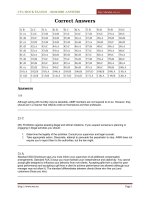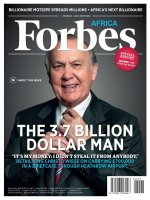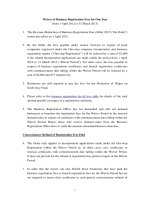FIRST MOCK EXAM PAPER (March 2013)
Bạn đang xem bản rút gọn của tài liệu. Xem và tải ngay bản đầy đủ của tài liệu tại đây (227.63 KB, 7 trang )
Nguyen Trai Secondary school
2012- 2013
Full name:___________________
FIRST MOCK EXAM PAPER (March 2013)
Mark the letter A, B, C, or D on your answer sheet to indicate the word that differs from the rest in the
position of the main stress in each of the following question.
1: A. dismal B. present C. contents D. decent
2: A. rescue B. upset C. finish D. uproar
3: A. enthusiasm B. generator C. mischievous D. reference
4: A. although B. sometimes C. museum D. export
5: A. perfect B. sincere C. mature D. technique
Mark the latter A, B, C, or D on your answer sheet to indicate the correct answer to each of the following
question.
6: Issues from price, place, promotion, and product are __________ of marketing strategies planning, despite
growing calls to expand the range of issues in today’s more complex world.
A. these that are among the most conventional concerns
B. among the most conventional concerns
C. they are among the most conventional concerns
D. those are among the most conventional concerns
7: Ann: __________
Ben: Thanks. I will write to you when I come to London.
A. God bless you! B. Have a nice trip! C. Better luck next time! D. Have a go!
8: Never __________ him stand on the deserted station platform.
A. will I forget to see B. I will forget to see
C. will I forget seeing D. I will forget seeing
9: The area was _______ by that storm, wasn’t it?
A. attacked B. struck C. beaten D. infected
10: If you book in advance you will __________ certainly have a better table at our restaurant.
A. mostly B. almost C. most D. the most
11: She gave me a __________ box.
A. small square jewellery metal B. small metal square jewellery
C. small square metal jewellery D. small jewellery square metal
12: Ann: Help!
Ben: __________
A. Wait on! B. I come at once! C. Moment! D. Just a minute!
13: She __________ her success to hard work.
A. described B. devoted C. blamed D. ascribed
14: Ann: More coffee? Anybody?
Ben: __________
A. I don’t agree. I’m afraid. B. I’d love to.
C. Yes, please. D. It’s right, I think.
15: The brothers __________ most of the buildings in the street before long.
A. are owning B. are going to own C. will have been owning D. will be owning
16: He has endless plans for starting a new career but they all seem to __________.
A. drop back B. drop off C. drop through D. drop away
17: Ben: Our team has just won the last football match
Ann: __________
A. Good idea. Thanks for the news. B. Yes. I guess it’s very good.
C. Well, that’s very surprising! D. Yes, it’s our pleasure.
18: The dead man’s widow said he had had a/an __________ that he would be killed in an accident.
A. knowledge B. experience C. presentiment D. warning
19: Ann: __________
Ben: I have a terrible headache.
A. What’s the matter with you? B. What’s the problem to you?
C. What happens with you? D. What causes you?
20: She pays an enormous insurance premium on the family heirloom, her most __________ possession.
A. worthless B. valueless C. honourable D. treasured
21: If you break the law, you will be __________ trouble.
A. out of B. out for C. in for D. for
22: Ann: Can I get you another drink?
Ben: __________
A. Forget it. B. No, I’ll think it over. C. No, it isn’t. D. Not just now.
23: When Mr Spendthrift ran out of money, he __________ his mother for help.
A. fell back on B. fell upon C. fell behind D. fell in with
24: It’s funny you should say that. I’ve just had the __________ thought.
A. like B. identical C. alike D. similar
25: __________, I decided to stop trading with them.
A. Despite of the fact that they were the biggest dealer
B. Though being the biggest dealer
C. Being the biggest dealer
D. Even though they were the biggest dealer
26: He always did well at school _______ having his early education disrupted by illness.
A. apart from B. in spite of C. in addition to D. because of
27: I refuse to believe a word of it; it’s a cock-and-__________ story.
A. hen B. goose C. bull D. duck
28: It was so quiet; you could have heard a ________ drop.
A. pin B. feather C. leaf D. sigh
29: ________ is not clear to researchers.
A. Why did dinosaurs become extinct B. Why dinosaurs became extinct
C. Did dinosaurs become extinct D. Dinosaurs became extinct
30: If a machine stops moving or working normally, you can say that it has __________.
A. cut off B. wiped out C. seized up D. go off
31: Drinking water ________ excessive amounts of fluorides may leave a stained or mottled effect on the
enamel of teeth.
A. containing B. including C. made up of D. composed of
32: Newspaper publishers in the States have estimated __________ reads a newspaper every day.
A. nearly 80 percentage of the adult population who
B. it is nearly 80 percent of the adult population
C. that nearly 80 percentage of the adult population
D. that nearly 80 percent of the adult population
Choose A, B, C or D to indicate the word of phrase that is OPPOSITE in meaning to the underline part in
each of the following questions:
33: Henry has found a temporary job in a factory.
A. eternal B. genuine C. permanent D. satisfactory
34: Mr. Smith’s new neighbors appear to be very friendly.
A. inapplicable B. hostile C. amicable D. futile
35: It is quiet incredible that he is unaware of such basis fact
A. unbelievable B. difficult C. disappointed D. imaginable
Read the following passage and mark the letter A, B, C, or D on your answer sheet to indicate the correct
work for each of the blanks.
Michael Faraday
During the last 400 years, most scientists have (36) __________ on mathematics in their development
of their inventions or discoveries. However, one great British scientist, Michael Faraday, did not make (37)
_________ of mathematics. Faraday, the son of a poor blacksmith, was born in London in 1791 and had no
(38) ____________ beyond reading and writing.
In 1812 Faraday was hired (39) ______ a bottle washer by the great chemist Humphry Davy. Later,
Faraday became a greater scientist than Davy, making the last years of Davy's life embittered (40) ________
jealousy. Faraday made the first (41) _________ motor in 1821, a device that used electricity to produce
movement. Then Faraday became interested in the (42) _________ between electricity and magnetism. In
1831 he discovered that when a magnet is moved near a wire, electricity flows in the wire. With this
discovery he produced a machine for making electricity (43) _________ a dynamo. Faraday then went on to
show how electricity affects chemical (44) ________.
Because Faraday believed that money should be given to the poor, when he grew old, he was
destitute. (45)______, Queen Victoria rewarded him for his discoveries by giving him a stipend and a house.
He died in 1867.
36:
A. relied B. insisted C. based D. elaborated
37:
A. usage B. advantage C. use D. utilization
38:
A. instruction B. knowledge C. training D. schooling
39:
A. to be B. being C. like D. as
40:
A. from B. with C. by D. at
41:
A. electric B. electrical C. electricity D. electrician's
42:
A. closeness B. relation C. relationship D. kinship
43:
A. named B. known C. entitled D. called
44:
A. matters B. substances C. materials D. equations
45:
A. Still B. So C. However D. Yet
Read the following passage and mark the latter A, B, C, or D on your answer sheet to indicate the correct
answer to each of the questions.
A survey is a study, generally in the form of an interview or a questionnaire, that provides
information concerning how people think and act. In the United States, the best-known
surveys are the Gallup poll and the Harris poll. As anyone who watches the news during
Line presidential campaigns knows these polls have become an important part of political life in
(5) the United States.
North Americans are familiar with the many "person on the street" interviews on local
television news shows. While such interviews can be highly entertaining, they are not
necessarily an accurate indication of public opinion. First, they reflect the opinions of only
those people who appear at a certain location. Thus, such samples can be biased in favor
(10) of commuters, middle-class shoppers, or factory workers, depending on which area the
newspeople select. Second, television interviews tend to attract outgoing people who are
willing to appear on the air, while they frighten away others who may feel intimidated by
a camera. A survey must be based on a precise, representative sampling if it is to genuinely
reflect a broad range of the population.
(15) In preparing to conduct a survey, sociologists must exercise great care in the wording
of questions. An effective survey question must be simple and clear enough for people to
understand it. It must also be specific enough so that there are no problems in interpreting
the results. Even questions that are less structured must be carefully phrased in order to elicit
the type of information desired. Surveys can be indispensable sources of information, but
(20) only if the sampling is done properly and the questions are worded accurately.
There are two main forms of surveys: the interview and the questionnaire. Each of these
forms of survey research has its advantages. An interviewer can obtain a high response rate
because people find it more difficult to turn down a personal request for an interview than
to throw away a written questionnaire. In addition, an interviewer can go beyond written
(25) questions and probe for a subject's underlying feelings and reasons. However, questionnaires
have the advantage of being cheaper and more consistent.
46: What does the passage mainly discuss?
A. The history of surveys in North America B. The principles of conducting surveys
C. Problems associated with interpreting surveys D. The importance of polls in American political life
47: The word "they" in line 8 refers to
A. North Americans B. news shows C. interviews D. opinions
48: According to the passage, the main disadvantage of person-on-the-street interviews is that they
A. are not based on a representative sampling B. are used only on television
C. are not carefully worded D. reflect political opinions
49: The word "precise" in line 13 is closest in meaning to
A. planned B. rational C. required D. accurate
50: According to paragraph 3, which of the following is most important for an effective survey?
A. A high number of respondents
B. Carefully worded questions
C. An interviewer's ability to measure respondents' feelings
D. A sociologist who is able to interpret the results
51: The word "exercise" in line 15 is closest in meaning to
A. utilize B. consider C. design D. defend
52: The word "elicit" in line 18 is closest in meaning to
A. compose B. rule out C. predict D. bring out
53: It can be inferred from the passage that one reason that sociologists may become frustrated with
questionnaires is that
A. respondents often do not complete and return questionnaires
B. questionnaires are often difficult to read
C. questionnaires are expensive and difficult to distribute
D. respondents are too eager to supplement questions with their own opinions
54: According to the passage, one advantage of live interviews over questionnaires is that live interviews
A. cost less B. can produce more information
C. are easier to interpret D. minimize the influence of the researcher
55: Which of the following terms is defined in the passage?
A. Survey (line 1) B. Public opinion (line 8)
C. Representative sampling (line 13) D. Response rate (line 22)
Mark the letter A, B, C, or D on your answer sheet to show the underlined part that needs correction in
each of the following questions.
56: Proteins are made up of folded irregularly chains, the links of which are amino acids.
A B C D
57: Although most species of small birds gather in groups at feeders provided by bird-watchers, the
A
bright red cardinals usually appears alone or with its mate.
B C D
58: The astronomy is the oldest science, but it continues to be at the forefront of scientific thought.
A B C D
59: Henry David Thoreau was an American writer who is remembered for his faith in religious
A B C
significance of the nature.
D
60: Gold or silver bullion serve into commerce mediums of exchange all over the world.
A B C D
Read the following passage and mark the latter A, B, C, or D on your answer sheet to indicate the correct
answer to each of the questions.
Passage 1
If we believe that clothing has to do with covering the body, and costume with the choice of a
particular form of garment for a particular use, then we can say that clothing depend primarily on
such physical conditions as climate, health, and textile manufacture, whereas costume reflect social
Line factors such as religious beliefs, aesthetics, personal status, and the wish to be distinguished from or
(5) to emulate our fellows.
The ancient Greeks and the Chinese believed that we first covered our bodies for some physical
reason such as protecting ourselves from the weather elements. Ethnologists and psychologists have
invoked psychological reasons: modesty in the case of ancients, and taboo, magical influence and the
desire to please for the moderns.
(10) In early history, costume must have fulfilled a function beyond that of simple utility, perhaps through
some magical significance, investing primitive man with the attributes of other creatures.
Ornaments identified the wearer with animals, gods, heroes or other men. This identification
remains symbolic in more sophisticated societies. We should bear in mind that the theater has its
distant origins in sacred performances, and in all period children at play have worn disguises, so as to
(15) adapt gradually to adult life.
Costume helped inspire fear or impose authority. For a chieftain, costume embodied attributes
expressing his power, while a warrior’s costume enhanced his physical superiority and suggested he
was superhuman. In more recent times, professional or administrative costume has been devised to
distinguish the wearer and express personal or delegated authority; this purpose is seen clearly in
(20) the judge’s robes and the police officer’s uniform. Costume denotes power, and since power is
usually equated with wealth, costume came to be an expression of social caste and material
prosperity. Military uniform denotes rank and is intended to intimidate, to protect the body and to









